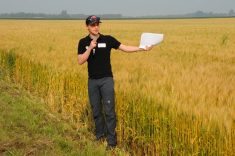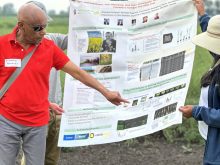The Manitoba Crop Alliance represents farmers who grow wheat, barley, corn, sunflowers and flax in the province.
But the organization has a problem.
As part of its mandate, the alliance invests check-off dollars into research projects to help Manitoba farmers become more productive and sustainable. Fulfilling that mandate is not easy because the group can’t find scientists to do the necessary research.
Read Also

New program aims to support plant-based exports to Asia
Understanding the preferences of consumers in Taiwan and how they differ from Indonesia or Malaysia isn’t easy for a small company in Saskatchewan.
“(For) our specialty crops, specifically corn, sunflowers and flax, we struggle to find any kind of contractor or institution that can work on those special crops in the province,” said chief operating officer Darcelle Graham from her office in Carman.
“We collect this checkoff. We want to invest in the areas of research we need to so (farmers) get a return on their investment.”
The organization is trying to solve the problem, and the first step is assessing research capacity in the province.
It is funding a study to identify the people and places that conduct crop research.
“Manitoba farmers are concerned that public and private agronomic research capacity has not kept pace with the growth of the industry,” says a Request for Proposals posted on the alliance’s website.
Graham hopes the study will unearth researchers, both public and private, who could work on projects for corn, flax and sunflowers.
“We have to start at ground zero and understand what is in the province,” she said.
“What we want to do is get a good handle on this. Where has this (research) landscape gone? Has it changed? Has it diminished?”
There are obvious examples of Manitoba lacking crop scientists. Agriculture Canada used to employ a flax breeder in Morden, but that position no longer exists. The decision may have accelerated the decline of flax. From 2017-23, Manitoba flax acres were at 40,000 to 70,000, down from 250,000 acres in the late 2000s.
On the positive side, Agriculture Canada recently filled a plant pathologist position for oilseed crops, which should benefit flax.
There is also a need to study flax utilization and potential ways to use flax straw because Schweitzer Mauduit closed its processing plant near Carman in 2021. Without that plant, flax growers have no place to sell their straw.
“That’s a big issue,” Graham said.
“We’re trying to find something for flax utilization.”
As for sunflowers, the group is seeking a researcher who can study soil fertility and what the crop needs for nitrogen and phosphorus.
“It’s some of the nitty gritty work that we need to do,” Graham said.
“It’s updating the fertility information. It hasn’t been done in the province for a long time.”
The organization is accepting proposals for its research capacity project until Oct. 20.
The plan is to have a report completed by January and present the findings at the alliance’s annual general meeting in Winnipeg Feb. 15.
Contact robert.arnason@producer.com


















